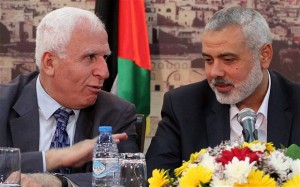Special to WorldTribune.com
WASHINGTON — A Palestinian reconciliation agreement has failed to determine the future of Hamas in the Gaza Strip, a report said.
The Washington Institute for Near East Policy said the April 23 agreement between Fatah and Hamas was riddled with uncertainty.

In a report, the institute said the announcement by the two movements appeared to reflect an attempt to bolster the two flagging Palestinian movements.
“The timing of the agreement amid U.S.-brokered peace talks, as well as both parties’ internal weaknesses, points to more serious intent than past efforts.” the report, titled “The Hamas-Fatah Reconciliation Agreement: Too Early To Judge,” said. “However, the deal fails to address the most sensitive issues separating the two sides and likely can be explained by the political boost it offers to both leaderships.”
Authors Ehud Yaari and Neri Zilber said the agreement would hamper efforts to extend Israeli-Palestinian peace negotiations past their April 29 deadline. But they asserted that Fatah and Hamas failed to make headway over numerous issues, particularly the return of the PA to the Gaza Strip.
“The agreement does not mention whether Gaza will remain under exclusive
Hamas control or whether the PA will be brought back to govern the breakaway
territory, specifically the border crossings with Israel and Egypt,” the
report, dated April 24, said.
Other unresolved issues included a merger between the PA and Hamas
security forces as well as the future of 70,000 Fatah civil servants in the
Gaza Strip. The report also cited Hamas’ arsenal of 10,000 rockets and
missiles amid a PA pledge to maintain a demilitarized Palestinian state.
Still, the report determined that both Hamas and the PA would garner
short-term gains from the agreement. Yaari and Zilber pointed to the sharp
decline in support for both regimes, accused of corruption, trampling of
human rights and refusal to hold elections.
“Rising economic hardship inside Gaza has led to growing resentment
against the Hamas government and, in turn, an increased willingness by the
Hamas leadership to view national reconciliation with Fatah as a pathway out
of its political and economic isolation,” the report said. “Not
surprisingly, Cairo has already indicated that it will reopen the Rafah
border terminal connecting Gaza to Egypt once a unity Cabinet is formed.”

You must be logged in to post a comment Login